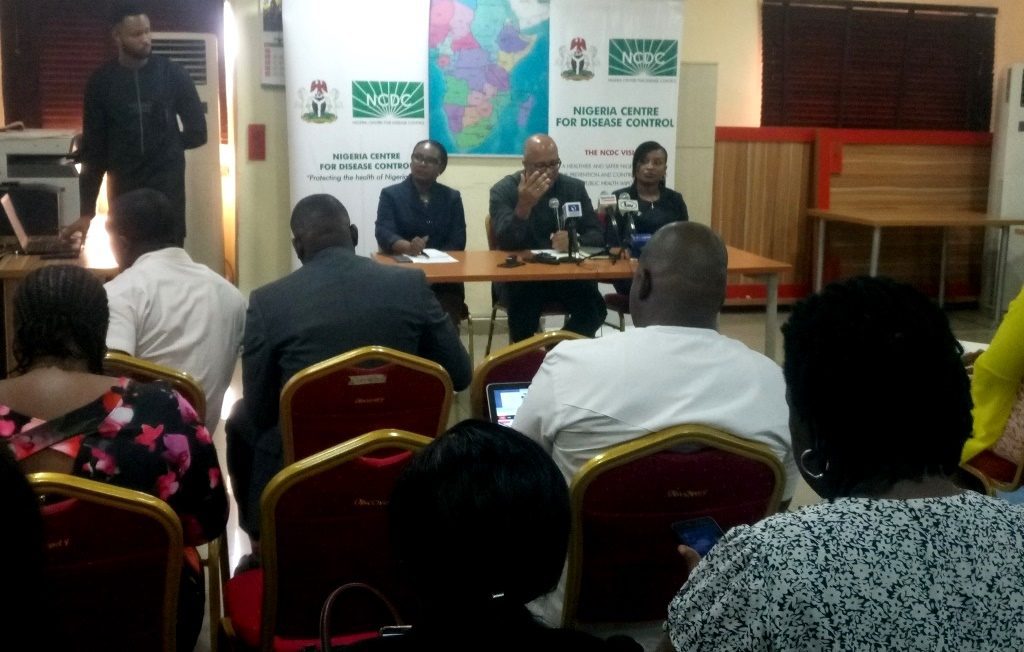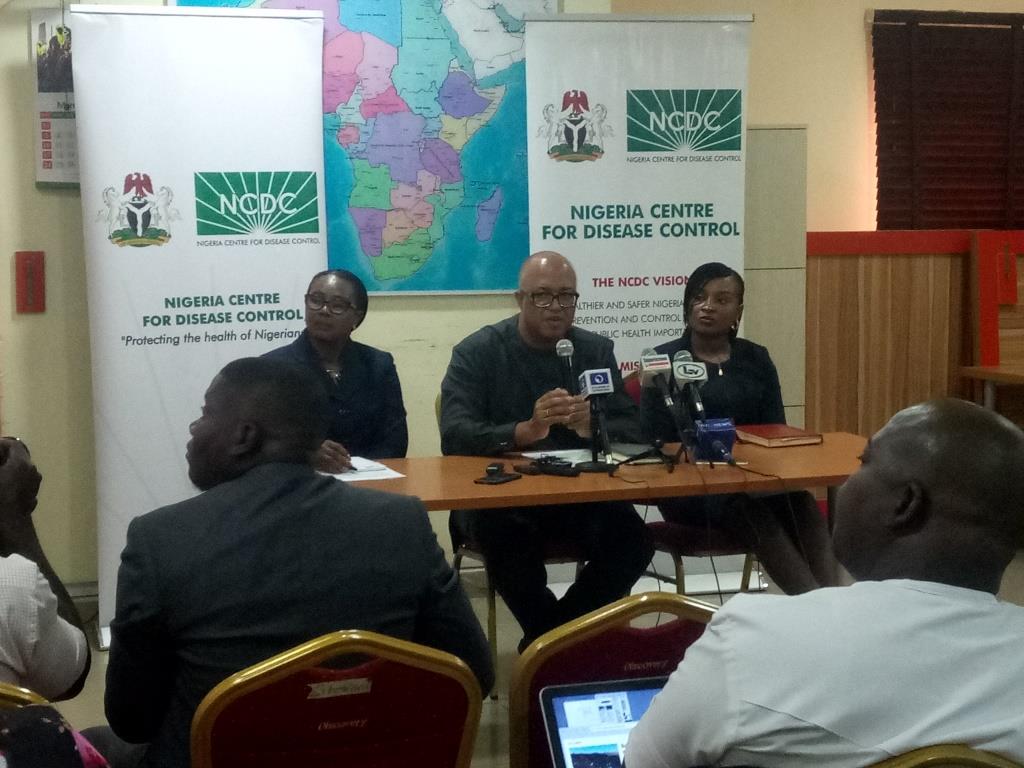The Director General of the Nigeria Centre for Disease Control (NCDC), Dr. Chikwe Ihekweazu, has revealed that the NCDC and partners’ efforts at containing further outbreak of Lassa Fever in some other parts of the country have yielded significant results since last year when the first case was reported.
He said NCDC as an organisation with a mandate to prevent the spread of diseases and her ever committed partners will continue to sustain response activities in states across the country, despite progress made so far.
“Over the last five weeks, there has been a decline in the number of new cases of Lassa fever reported in Nigeria. In addition, the country has witnessed a reduction in the number of people who have died from the disease, compared to 2018” he remarked while interacting with members of the press at a briefing held yesterday, 11th of March 2019.
Giving the detailed account of how the organisation has been able to deliver efficiently and structures put in place to nip the outbreak in the bud particularly when the recent outbreak was announced earlier in January this year.
“An outbreak of Lassa fever was declared in Nigeria on the 21st of January 2019. Since then, 420 confirmed cases and 93 deaths have been reported in 21 States. The national response is being coordinated by the national, multi-sectoral, multi-partner Emergency Operations Centre (EOC) led by NCDC. In addition, NCDC has supported Ebonyi, Edo, Ondo, Plateau and Kebbi states in activating sub-national level EOCs for coordination”‘ he disclosed.
“Following the large Lassa fever outbreak in 2018, the NCDC together with partners instituted five key measures to ensure improved preparedness in 2019.
- Trained over one thousand health care workers in the six zones in the country on Lassa fever management, diagnosis and surveillance, together with the Irrua Specialist Teaching Hospital;
- Prepositioning of treatment and diagnostic supplies to the 21 states that recorded cases in 2018, treatment centres and laboratories;
- Publication of Lassa fever messages on three major newspapers, weekly radio shows on Radio Nigeria, and intensive community engagement;
- High level advocacy visits to State Governments, encouraging them to do more to prevent and respond to cases of Lassa fever;
- Developed new case management guidelines, initiated a Lassa fever Research Consortium and hosted and International Conference on Lassa Fever to share knowledge”.
Chikwe added that immediately following the declaration of the 2019 outbreak, Rapid Response Teams (RRTs) comprising officers from the NCDC, Federal Ministry of Agriculture and Rural Development and Federal Ministry of Environment have supported the response in the high burden states of Edo, Ondo, Ebonyi, Plateau, Bauchi and Taraba states. In these states, NCDC has also supported full availability of drugs, personal protective equipment, laboratory reagents and other supplies required for case management and diagnosis of Lassa fever. This year, there has been no single stock-out reported in any state.

In January 2019, NCDC hosted the first Lassa fever International Conference. This brought together the largest gathering of researchers and professionals to discuss progress on Lassa fever. Importantly, Nigeria introduced her national Lassa fever research plan and has been recognised as one of the leading stakeholders in global Lassa fever research. Over the last six months, progress has been made in this area especially in discussions around Lassa fever vaccines. In the next one year, Nigeria is expected to be part of clinical trials towards the development of Lassa fever vaccines.
In 2018, genetic sequencing carried out at the Irrua Specialist Teaching Hospital showed that the virus circulating originated from the pool of lineages that have been in Nigeria since the first discovery. This year, early sequencing result shows similar findings. The preliminary results of 42 Lassa fever virus sequences indicate that rodent to human transmission, as observed in 2018, is still the dominant route of transmission. Therefore, there is a strong need to improve prevention measures especially around environmental sanitation.
The progress recorded in the response to the 2019 Lassa fever outbreak including an early decline in the number of new cases and reduced case fatality have been attributed to various factors. This includes the early deployment of One-Health national RRTs, improvement of functions in Lassa fever treatment centres, revision of case management guidelines, enforcement of environmental sanitation in some states, introduction of the Infection Prevention and Control (IPC) ring strategy, targeted intensified risk communications activities, high level advocacy visits, operational research into response activities, amongst others. We are grateful to our partners including the World Health Organization, UK Public Health Rapid Support Team, Medecins Sans Frontiers, World Bank, ALIMA, African Field Epidemiology Network. We also applaud the efforts of state epidemiologists, treatment centres and laboratories in the country, especially the Irrua Specialist Teaching Hospital Edo, Federal Medical Centre Owo, Ondo and Federal Teaching Hospital Abakaliki, Ebonyi.
It is very important that Nigerians continue to practice preventive measures to avoid infection. Prevention of Lassa fever relies on promoting good community hygiene to discourage rodents from entering homes. Other effective measures include storing grains and other foodstuff in rodent-proof containers, proper disposal of garbage far from the home, maintaining clean households and frequent hand hygiene. All food should be well prepared, and family members should always be careful to avoid contact with blood and body fluids while caring for sick persons.
Healthcare workers are urged to maintain a high index of suspicion for Lassa fever when handling patients, irrespective of their health status. Lassa fever should be considered in patients with fever, headache, sore throat and malaise, in whom Malaria has been ruled out with a rapid diagnostic test (RDT), especially when patients are not getting better. Health workers should adhere to standard precautions including wearing protective apparels when handling suspected Lassa fever patients. The revised Lassa fever case management guidelines are available on the NCDC website, www.ncdc.gov.ng.
Lassa fever is a viral infection caused by the Lassa fever virus, primarily transmitted to humans through direct contact, eating food or drinking water contaminated with urine, faeces, saliva or blood of infected rats. Person-to-person transmission is through contact with blood, urine, saliva, throat secretion or semen of an infected person. The disease can be treated, with early presentation to a healthcare facility greatly increasing the chances of survival. Early signs of the disease include sudden fever, sore throat and general body weakness.
ABOUT NCDC
The Nigeria Centre for Disease Control (NCDC) was established in the year 2011 in response to the challenges of public health emergencies and to enhance Nigeria’s preparedness and response to epidemics through prevention, detection, and control of communicable diseases. Its core mandate is to detect, investigate, prevent and control diseases of national and international public health importance.
Contact:
NCDC Toll-free Number: 0800-970000-10
SMS: 08099555577

Very nice article, just what I wanted to find.
I want to to thank you for this great read!! I definitely enjoyed every little
bit of it. I’ve got you book-marked to check
out new stuff you post…
Way cool! Some very valid points! I appreciate you penning
this write-up and the rest of the site is also very good.
It’s going to be ending of mine day, however before finish I am reading this wonderful post to increase my know-how.
Oh my goodness! Impressive article dude! Thank you, However I am encountering troubles with your
RSS. I don’t know why I can’t join it. Is there anyone else getting
similar RSS problems? Anybody who knows the answer can you
kindly respond? Thanx!!
all the time i used to read smaller articles or reviews
which as well clear their motive, and that is also happening with this article which I am reading at this place.
Thank you for the auspicious writeup. It in fact was a amusement account it.
Look advanced to more added agreeable from you!
By the way, how could we communicate?
look the test
Hey there! I simply wish to offer you a big thumbs up
for your excellent information you have got right here on this post.
I will be returning to your site for more soon.